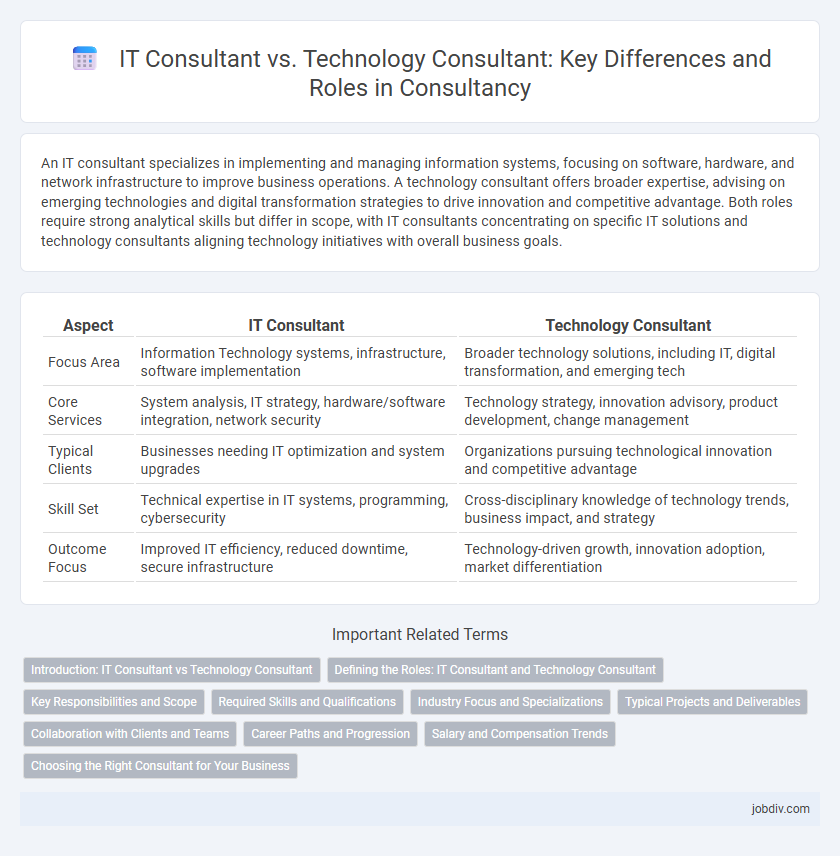An IT consultant specializes in implementing and managing information systems, focusing on software, hardware, and network infrastructure to improve business operations. A technology consultant offers broader expertise, advising on emerging technologies and digital transformation strategies to drive innovation and competitive advantage. Both roles require strong analytical skills but differ in scope, with IT consultants concentrating on specific IT solutions and technology consultants aligning technology initiatives with overall business goals.
Table of Comparison
| Aspect | IT Consultant | Technology Consultant |
|---|---|---|
| Focus Area | Information Technology systems, infrastructure, software implementation | Broader technology solutions, including IT, digital transformation, and emerging tech |
| Core Services | System analysis, IT strategy, hardware/software integration, network security | Technology strategy, innovation advisory, product development, change management |
| Typical Clients | Businesses needing IT optimization and system upgrades | Organizations pursuing technological innovation and competitive advantage |
| Skill Set | Technical expertise in IT systems, programming, cybersecurity | Cross-disciplinary knowledge of technology trends, business impact, and strategy |
| Outcome Focus | Improved IT efficiency, reduced downtime, secure infrastructure | Technology-driven growth, innovation adoption, market differentiation |
Introduction: IT Consultant vs Technology Consultant
IT Consultants specialize in aligning business objectives with IT infrastructure, offering expertise in software implementation, systems integration, and optimizing IT processes. Technology Consultants provide broader guidance on emerging technologies, innovation strategies, and digital transformation initiatives across various industries. Both roles drive technological adoption but differ in scope, with IT Consultants focusing on operational IT solutions and Technology Consultants emphasizing strategic technology advancements.
Defining the Roles: IT Consultant and Technology Consultant
An IT Consultant specializes in advising organizations on managing and optimizing their information technology infrastructure, including hardware, software, and networks. A Technology Consultant focuses on broader technological solutions, integrating new technologies such as AI, IoT, and cloud computing to drive innovation and improve business processes. Both roles require expertise in technology but differ in scope, with IT Consultants concentrating on existing IT systems and Technology Consultants emphasizing emerging technologies and strategic implementation.
Key Responsibilities and Scope
IT Consultants focus on optimizing and managing information systems, ensuring seamless integration, security, and performance within an organization's IT infrastructure. Technology Consultants provide strategic guidance on adopting emerging technologies, digital transformation, and innovation to align business goals with technological advancements. Both roles collaborate to enhance operational efficiency but differ in scope--IT Consultants address technical implementation while Technology Consultants emphasize strategic technology planning.
Required Skills and Qualifications
An IT consultant requires expertise in information systems, network infrastructure, and cybersecurity protocols, alongside certifications such as CompTIA, Cisco, or Microsoft Azure. A technology consultant demands broader knowledge in emerging technologies, digital transformation, and business process integration, often possessing qualifications like PMP, TOGAF, or specific vendor certifications. Both roles emphasize analytical thinking, project management skills, and effective communication to align technological solutions with business objectives.
Industry Focus and Specializations
IT consultants specialize in optimizing and managing an organization's information systems, focusing on software development, cybersecurity, and IT infrastructure across industries like finance, healthcare, and retail. Technology consultants offer broader guidance on emerging technologies such as AI, IoT, and cloud computing, tailoring solutions to specific industry challenges like manufacturing digitization or telecom network upgrading. Industry focus for IT consultants leans towards IT operational efficiency, while technology consultants target strategic innovation and technology adoption within niche sectors.
Typical Projects and Deliverables
IT Consultants typically manage projects involving network infrastructure upgrades, software implementation, and cybersecurity enhancements, delivering detailed system audits, integration plans, and user training programs. Technology Consultants focus on broader digital transformation initiatives, including emerging technology adoption like AI, IoT, and cloud computing, providing strategic roadmaps, innovation workshops, and technology feasibility reports. Both roles deliver tailored solutions that align with organizational goals but differ in scope and technological emphasis.
Collaboration with Clients and Teams
IT consultants specialize in aligning information technology systems with business goals by working closely with clients to assess current infrastructure and recommend scalable solutions. Technology consultants focus on integrating emerging technologies and digital tools, collaborating with multidisciplinary teams to drive innovation and optimize operational processes. Both roles emphasize effective communication and partnership to deliver tailored strategies that meet client needs and enhance overall performance.
Career Paths and Progression
IT consultants specialize in implementing and managing information systems, focusing on software solutions, network infrastructure, and cybersecurity to optimize organizational IT operations. Technology consultants have a broader scope, advising on emerging technologies such as AI, IoT, and digital transformation strategies to drive innovation and competitive advantage. Career progression for IT consultants often follows roles like systems analyst, IT project manager, and CIO, while technology consultants may advance toward roles in strategic technology advisory, innovation leadership, or CTO positions.
Salary and Compensation Trends
IT consultants typically command salaries ranging from $80,000 to $130,000 annually, driven by expertise in system implementation and network management, while technology consultants often earn between $90,000 and $140,000 due to their focus on strategic technology integration and innovation. Compensation packages for both roles increasingly include performance bonuses, stock options, and comprehensive benefits, reflecting industry demand for advanced technical and advisory skills. Salary growth trends indicate a steady increase of 5-7% annually, fueled by digital transformation initiatives across sectors.
Choosing the Right Consultant for Your Business
Selecting the right consultant for your business hinges on understanding the distinction between an IT Consultant and a Technology Consultant. IT Consultants specialize in optimizing internal systems, infrastructure, and software to improve operational efficiency, while Technology Consultants focus on integrating emerging technologies and innovative solutions aligned with long-term business strategy. Evaluating your company's immediate IT needs versus future technological growth objectives ensures you partner with the consultant best suited to drive sustainable digital transformation.
IT Consultant vs Technology Consultant Infographic

 jobdiv.com
jobdiv.com